In this webinar we consider factors vital to rural evangelism. Time was taken to explore areas like living as witnesses in everyday encounters, circles of relationships, necessary culture shifts within churches, the role of prayer, a learning/curious posture with others and the strategic use of questions.
We also introduced the Journey Toward Jesus scale that provides insights into the common steps involved in a person’s journey to recognizing who Christ is and the importance of placing one’s trust in Christ as their Savior. In summary, this webinar reinforces the practices of fostering authentic relationships and taking small steps that can lead to gospel conversations with others.
Additional Resources:
- Thriving in Relational Ministry Webinar 5.15.2025 Slides – Bruce Dick
- Five “Shifts” Needed to Share Christ in Rural Areas (Rural Impact Leadership Conference 2025 workshop)
- OHCC Rural Leadership Certificate Program (2024-2026)
- OHCC Flier – Rural Evangelism Disciple-Making course (July-Aug. 2025) (003)
While the winter winds and snow blew across the greater Minnesota landscape, 85 rural/small-town pastors and leaders gathered for the fourth annual Rural Impact Leadership Conference (RILC) on March 15, 2025, at Alexandria Covenant Church in Alexandria, MN.
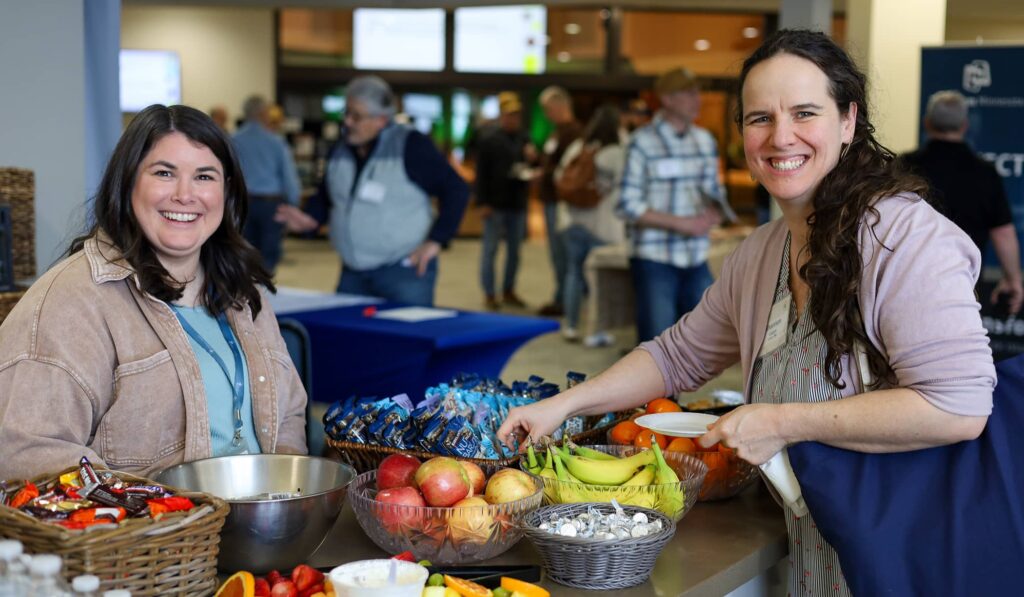
In addition, 33 individual attendees from California, Idaho, Illinois, Illinois, Kentucky, Michigan, Minnesota, Montana, Nebraska, North Dakota, Washington, and Saskatchewan joined online. And new this year we had online watch parties ranging from 5-15 participants in Hutchinson and Worthington, MN, Manhattan, Montana, Durbin, Manitoba and Nelson, British Columbia.
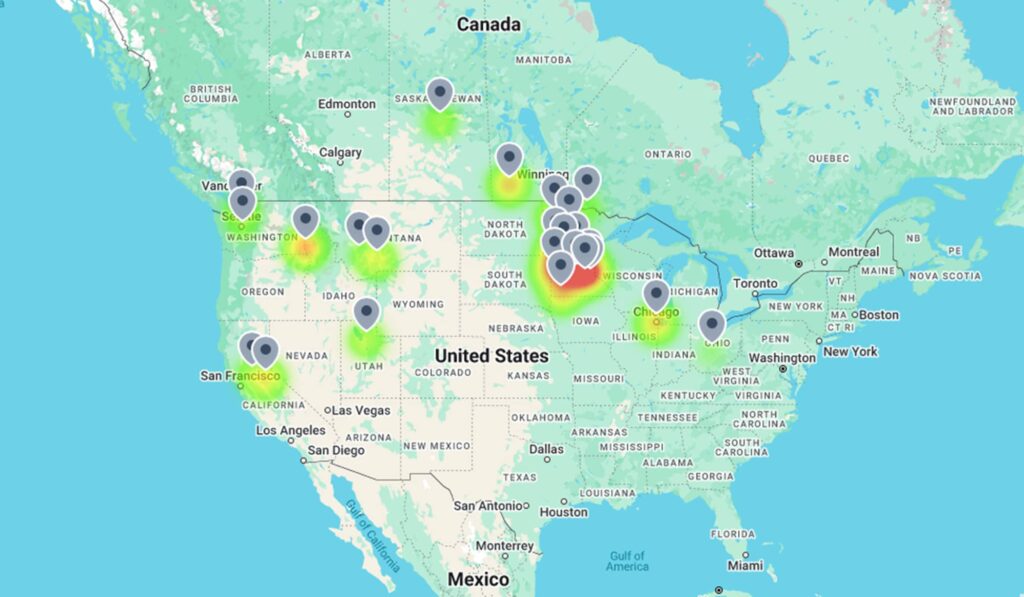
“A wonderful conference and a wonderful host church!”
The day included times of worship opening and closing the conference, along with presentations by Dr. Martin Giese and Rev. Kara Stromberg based on Psalm 1. The framing question they each answered was: How do we stay effective in our calling to the mission of the Church in what may be the most difficult and complex time in history? A few of their guiding insights were to delight and meditate on God’s word, and to be rooted and resilient in our relationship with God which prepares us to faithfully weather and impact our times!
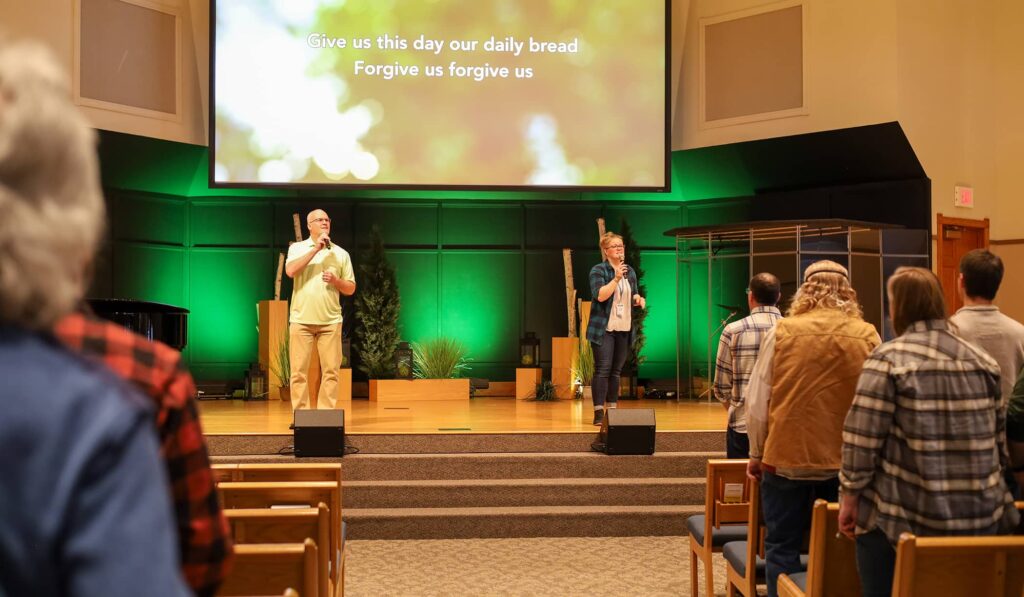
“Worship was amazing”
Practical instruction was also offered addressing strategic ministry areas through the day’s nine workshops: Building the Team Today for the Church Tomorrow; Five “Shifts” Needed to Share Christ in Rural Areas; Suicide Prevention and Response in Ministry; Church Revitalization Made Slightly Less Difficult; Gen Alpha: Resilient Ministry with Kids; From Trauma to Triumph: What to Know and Do Related to First Peoples and First Peoples Ministry in North America; Leadership Math; Stepping Off the Hamster Wheel; and Addressing Pornography Directly and Compassionately.
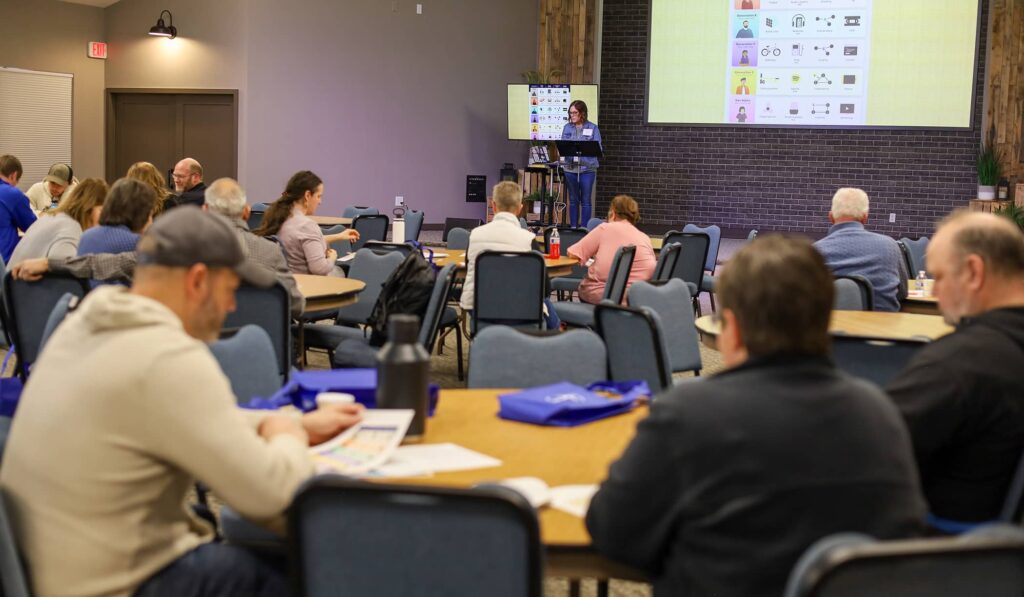
“I am used to feeding and equipping others; it was so great to be fed and equipped!”
For those onsite, exhibitors offered an array of resources including published materials and trainings on rural ministry, children, youth, and family ministry, congregational revitalization, along with a rural ministry certificate program. In addition, mental health supports and resources for local pastors and churches, mission opportunities and other specialized ministry services were presented. All of these provided further ways to resource thriving churches.
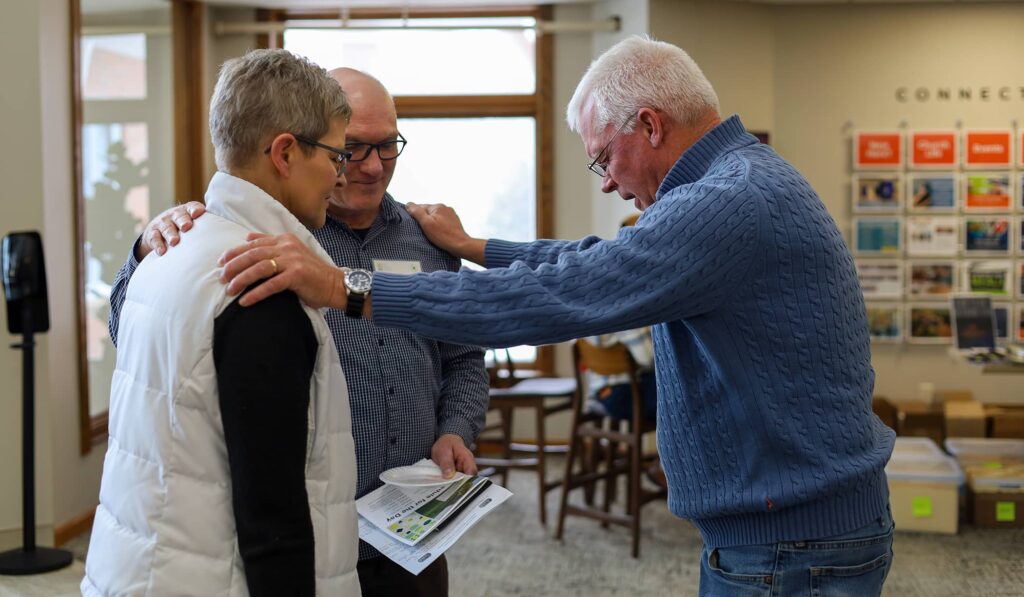
“I found the whole day great! Such helpful and relevant information shared, and encouragement extended.”
Here’s what a few other participants shared about their experience:
- “I was on-site, but I noticed how all of the speakers did well in relaying their conversations with both those on-site and those online.”
- “RILC provided good information, broken into small bites.”
- “I found the topics relevant, and the speakers knew their subject matter.”
- “The livestream was easy, and I loved having access to the presentation slides and for some their notes as well.”
- “This conference is such a wonderful opportunity for me to hear experts speak. From my perspective the conference went very well! Inspiring music, great opening session and well-done choice of topics to engage in.”
- “With our group, everyone felt the sessions were timely and helpful”
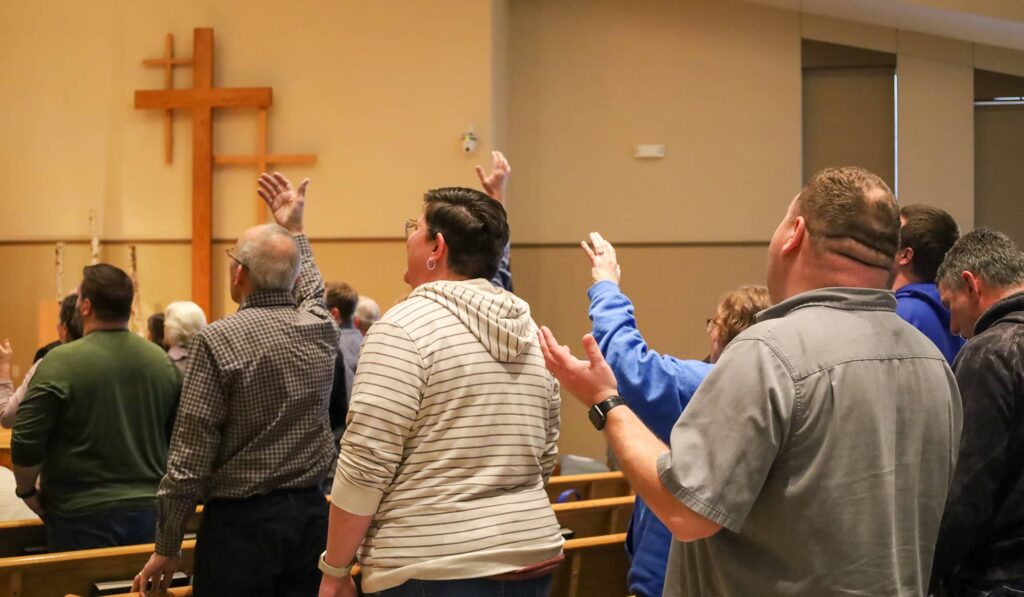
Once again, we are praising God for our partners, for all of the participants and presenters and the presence of God’s Spirit that provided a rich day in the nurture of thriving rural churches! We hope you will plan to join us next year on March 14, 2026!
In this webinar we focus on recasting conflict as an opportunity v.s. an offense in our journey with others and the specific role of the pastor/leader in this pursuit. We did this by using Acts 15—The Jerusalem Council—as a learning case study.
In this text we find the early Church wrestling with the new idea that salvation in Christ was for gentiles who remained as gentiles rather than becoming converts to Judaism. This was a seismic shift for the early Church—holding all of the potential drama, emotion and split potential for any movement to face.
The recording is shorter with this webinar as we broke into small groups for part of our time. The recording includes the opening framing comments and the full group reflection time following small groups.
Because of the scope and significance of this topic we offer the following resources for reference/use as well:
- When Sheep Squabble
- 5 Ground Rules
- Why have a Behavioral Covenant
- Dev a Behavioral Covenant
- Non-Anxious Leadership
- Pathway to Peace flyer
- Peace Making Principles pamphlet
- Healthy Guide to Healthy Church Conflict
In this webinar we explore matters related to ministry calling, pacing, disciplines/practices and negotiating wins and losses as foundations to our formation and resilience in thriving. Some additional factors also noted were one’s temperament, limits, life stage, vision, context, presenting crises, self-integrity and rest. This is definitely a full menu to consider and apply toward a faithful long run!
Using Paul’s words in 2 Corinthians 5:20 as a base text, in this webinar we provide some perspective and principles for helping us answer the question: “How are Christians to engage civically and politically in our day?” We provide reflections in three primary areas: being citizens of God’s Kingdom; being citizens of earthly nations/states; and contrasting patriotism vs. nationalism.
Recognition is also given to the reality that Christ followers often find themselves in spaces in-between polarities, conflicting world views and places of strong disagreements in public spaces. The opportunity/challenge in these spaces—maintaining authentic, thoughtful, respectful, Godly posture and engagement within each of these human intersections for God’s glory.
Blessing Our Communities- May 2024 webinar- Hodgson
Ben Winchester is a rural sociologist with the University of Minnesota- Extension. For the 2024 Rural Impact Leadership Conference, Winchester provided a pre-recorded workshop called “Rewriting the Rural Narrative,” which was available to online participants. On April 4, Winchester provided a free follow-up webinar to RILC attendees called “Living in the Middle of Everywhere.” An overview of the presentation, related resources and a recording of the webinar are provided below.
The notion that rural residents live “in the middle of nowhere” continues a negative narrative that is not based on the reality of community life. Modern life is complex as we live, work, shop and play in a wide region. At the same time, most of our planning is done at a city or county level. In “Living in the Middle of Everywhere” we will explore the implications for tourism, marketing, transportation planning, resident recruitment, housing, community development and the Church. One specific way of gaining a better understanding for this web of regional activity as it varies by age and interests is through an Asset-Based Community Development exercise that has some simple, but deep, learning outcomes.
Resources:
- Living in the Middle of Everywhere Presentation Slides (PDF)
- Living in the Middle of Everywhere Article (Link)
The energy and engagement from the 160 people that gathered in person for the third annual Rural Impact Leadership Conference (RILC) was evident throughout the day. In addition, 25 online attendees from 11 states joined the event, which took place March 16, 2024, at Alexandria Covenant Church in Alexandria, MN.
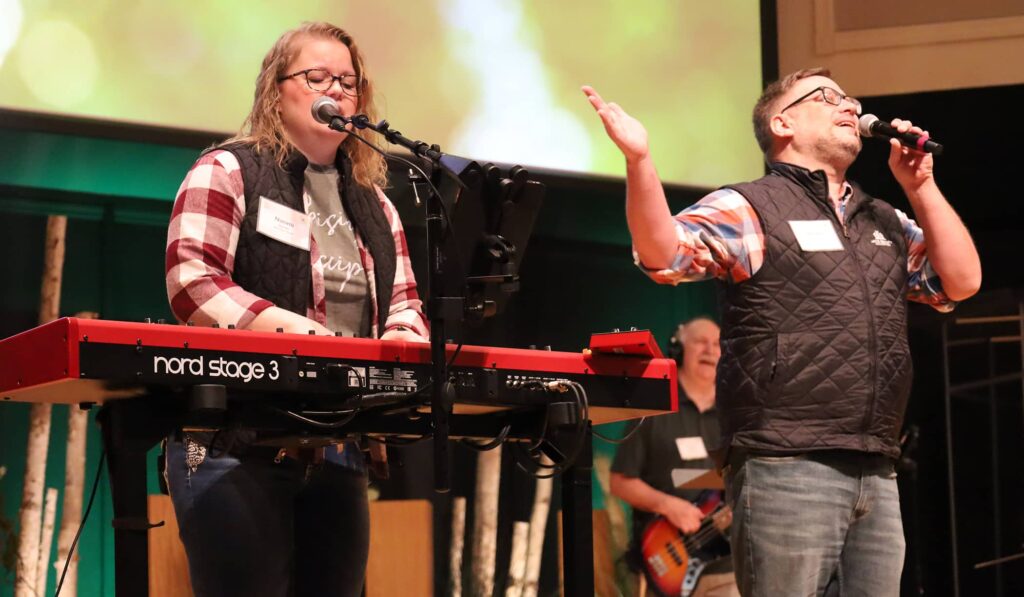
Worship was a blessing!
The conference opened and closed with music sets that bookended the day from a posture of worship! In the opening and closing sessions, Dr. Jeff Clark invited the audience to take a fresh look at the components involved in restoring a missional mindset and pathway forward for their church.
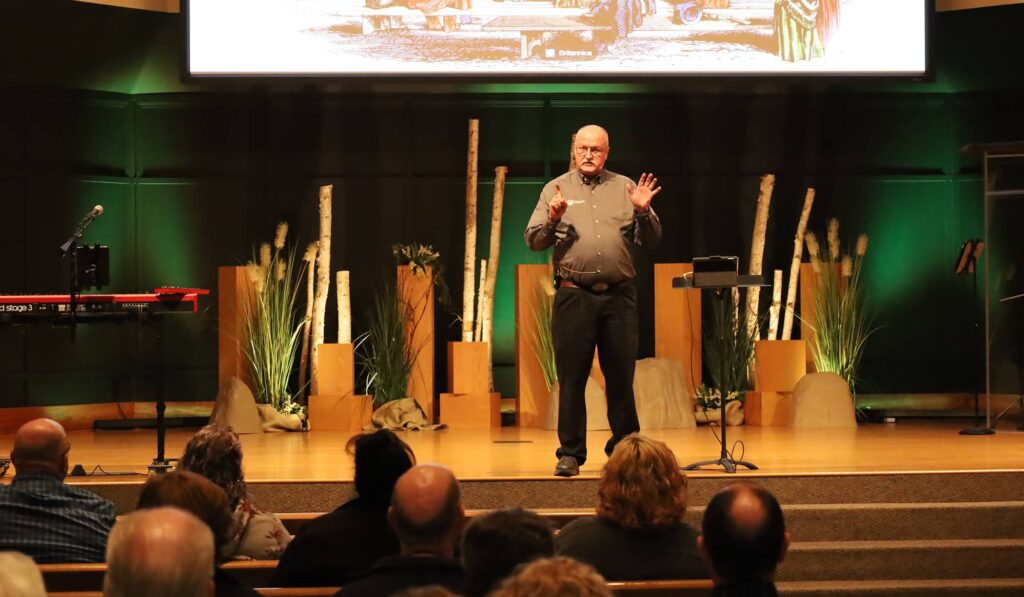
The practical insights and inputs from the day were timely!
Workshops that explored contextual applications and approaches to various ministry areas were scattered throughout the day. This included: “Daily Living as Witnesses,” “Leading Effective Change,” “Discipline That Connects with Your Child’s Heart,” “Building and Supporting a Volunteer Ministry Team,” “Asset Mapping of Congregations,” “Transforming Communities through Cross Cultural Friendships,” “Rewriting the Rural Narrative” and “Community Engagement Through Partnering with Community Leaders.”
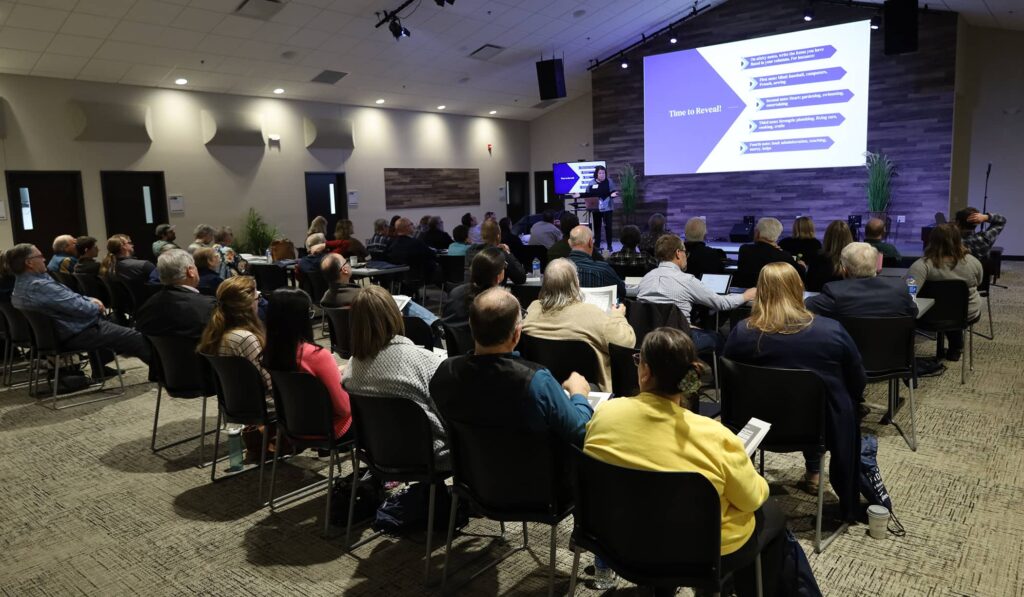
In-person participants were also offered pop-up conversations that included: “Youth Ministry Issues in the Smaller Church,” “Faith Formation of Children,” and “How an Evangelistic Culture Change Can Happen for a Congregation.”
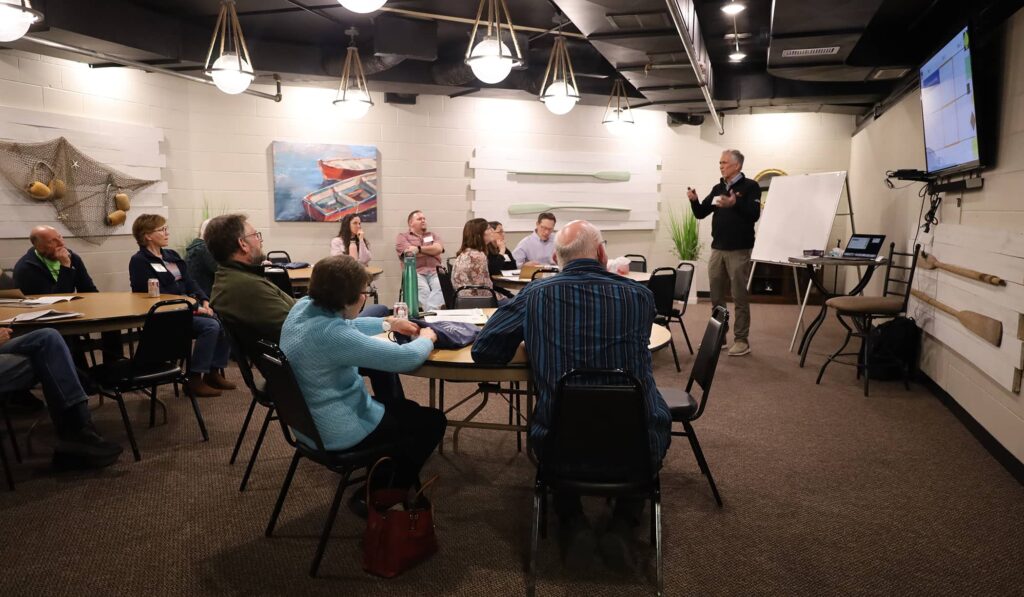
It was a full and fruitful day!
Exhibitors offered an array of resources for church ministries and mission. These included: Broken Strength, Child Evangelism Fellowship of MN, Connected Families, ECC Missional Vitality, EvangelismSHIFT USA, Growing Hope Globally, Helping Churches Thrive, Living Works, LunchBox, NextStep Resources, Oak Hills Christian College, Transform MN, Village Missions, WorkForce Hope, and Youth Ministry Consultants.
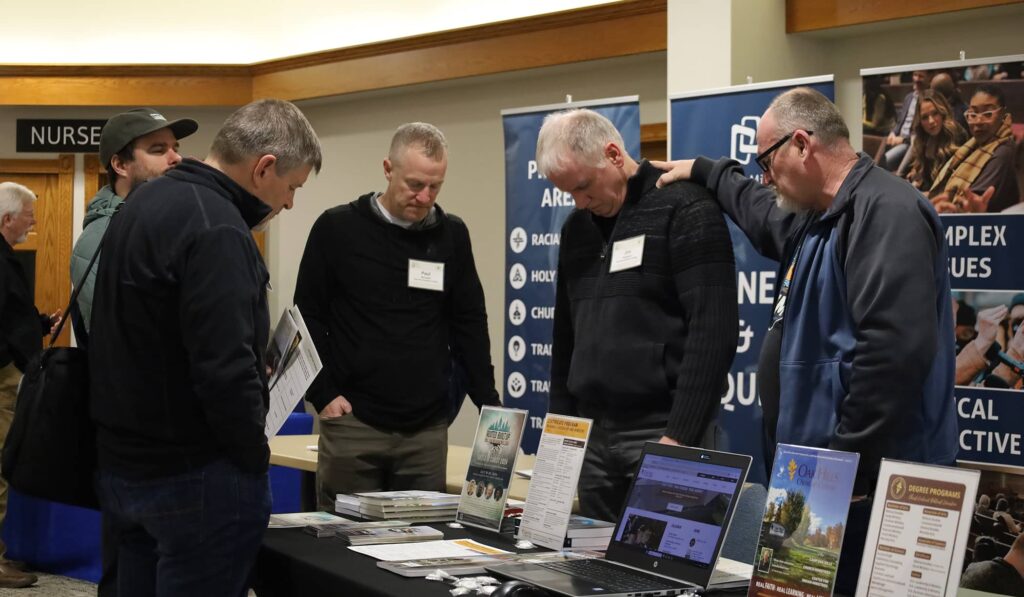
Alexandria Covenant Church was so welcoming!
We praise God for how He blessed and used this day in the nurture of rural churches. We look forward to the continued effect of the Rural Impact Leadership Conference, even as we anticipate RILC 2025 on March 15!
A primary basis for all these webinars is the realization that ministry is always geographically, culturally, and locally contextual. Therefore, the rural church is a unique contextual ministry category with its own set of relationships and dynamics. So, in this webinar we unpack further how rural churches think and operate in order for us to lead the church more effectively in its mission.
To help inform this particular conversation, Dr. Jeff Clark, Director of the Rural Matters Institute at Wheaton College, joined us as our guest presenter. Some of the areas addressed within this conversation are: the distinctives within the rural church compared to the suburban church, insights on how a person raised in an urban or suburban setting can succeed in ministry within a rural setting, the required process to gain acceptance for a pastor by the church and its community, the importance of learning the relational interplay within rural communities and churches, and what are most asked questions from new pastors just starting in a rural church.
The webinar concludes with a time of questions and answers from the participants.
Leading missional change for kingdom impact is essential to fulfilling the purpose of the Church. In this webinar we explored this critical leadership task in a conversation with Dr. Rick Weinert, based on his new book, “Four Essentials: Leading Effective Change in a Rural Church Setting.”
As implied in the title, Weinert introduces four essentials for leading effective change. He then offers further detail into establishing clarity of direction and exegeting one’s congregation and community.
In the final section, the whole group engaged in shared reflections around the formation of spiritually/emotionally/relationally healthy leaders for congregational health and leadership effectiveness.
Download Webinar transcript with additional resources
Building off Part 1, in this webinar we explore additional contextual factors that impact our understanding of leadership in the rural church. We give primary attention to unpacking the growing phenomena identified as reverse migration—that being growing numbers of people moving from urban/metropolitan settings now into the countryside. With this migration we observe a newer cross-cultural intersection for rural communities to navigate—the intersection or collision of the rural mindset with the urban (metropolitan) mindset. It’s within these relational encounters that dynamics like contrasting cultural assumptions, lifestyle distinctives, and varied perspectives on resources, decision-making and leadership surface and must be led through well.
In addition to this featured area of the webinar, participants identified and discussed other contextual factors like the pace of change and the related levels of grief and loss experienced within communities/congregations; competing political and sociocultural voices/movements outside and within the church; dramatic shifts to the scope and scale of farming and other land-based enterprises; and generational differences also being critical areas for leadership awareness and approach.
The following links provide access to the supporting presentation and other resources provided:
- Distinctives of the Rurban Collision- Giese- May 23 webinar
- The Thriving Rural Church- NAE Magazine 2017
- Identified Rural-Small Town Ministry Resources- Oak Hills Team for Rural Webinar series
While the winter winds and loose snow blew across the greater Minnesota landscape, 115 rural/small-town pastors, leaders and ministry students gathered for the second annual Rural Impact Leadership Conference (RILC) on March 18, 2023, at Alexandria Covenant Church in Alexandria, MN.
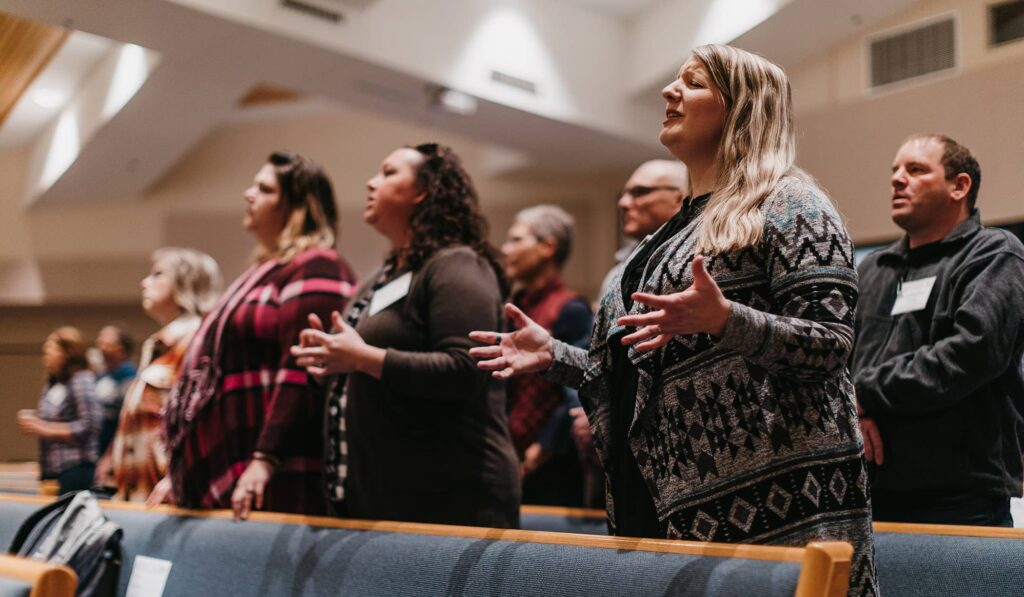
In addition, 35 virtual attendees from Minnesota, North Dakota, Wisconsin, Illinois, Michigan, Pennsylvania, Georgia, Florida, California, Washington, Saskatchewan and Alaska joined online.
“The entire day was great.”
The conference kicked off with a wonderful time of worship and an opening address by Dr. Glenn Daman entitled, “Finding Stability in a Changing World.” Taking from the first chapter of James, Daman built upon the foundational principle found in verses 17-18—that our stability in a changing world comes from the very nature of who God is.
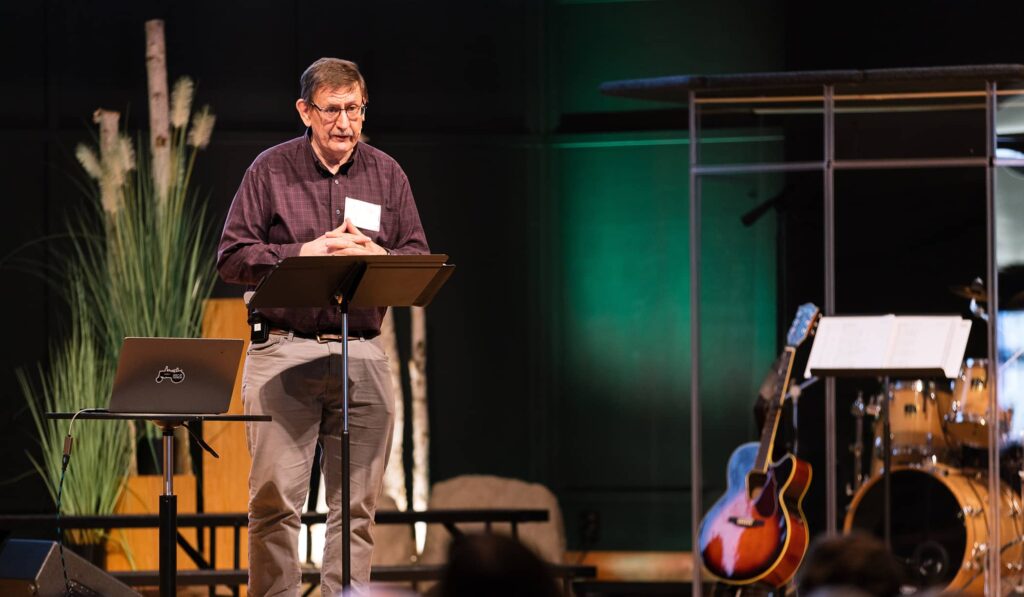
God’s nature throughout time demonstrates that God’s character remains unchanging, God’s message does not change and God’s mission remains the same. Therefore, in a changing world—which he reminded everyone will only continue—the most important decision we make as the people of God is to affirm what we cannot change and build upon those things.
In many ways, Daman’s remarks set the stage for the remainder of the day. For embedded throughout the workshops, conversations, exhibiting resources and the closing session, the conference centered on the contextual application of the rural church in faithfully living out the mission and message of Jesus.
“Worship was amazing.”
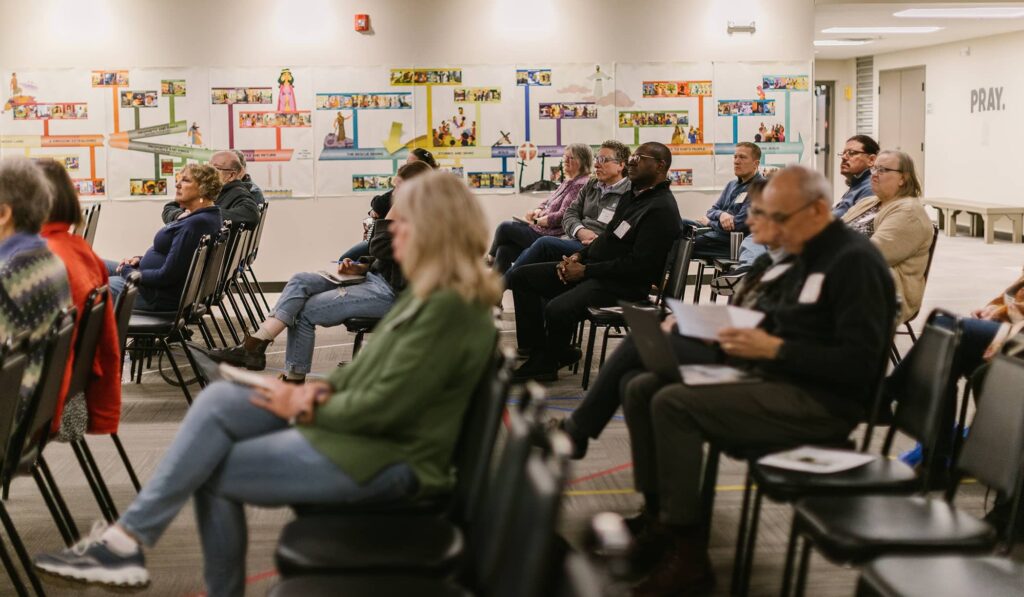
Some specific areas regarding contextual application explored through the day’s workshops were: evangelism in a context where there are few strangers; equipping lay leaders for advancing the mission of the church; loving our neighbors who face mental health challenges, or who are culturally different from us; and how to effectively transfer faith to the next generations.
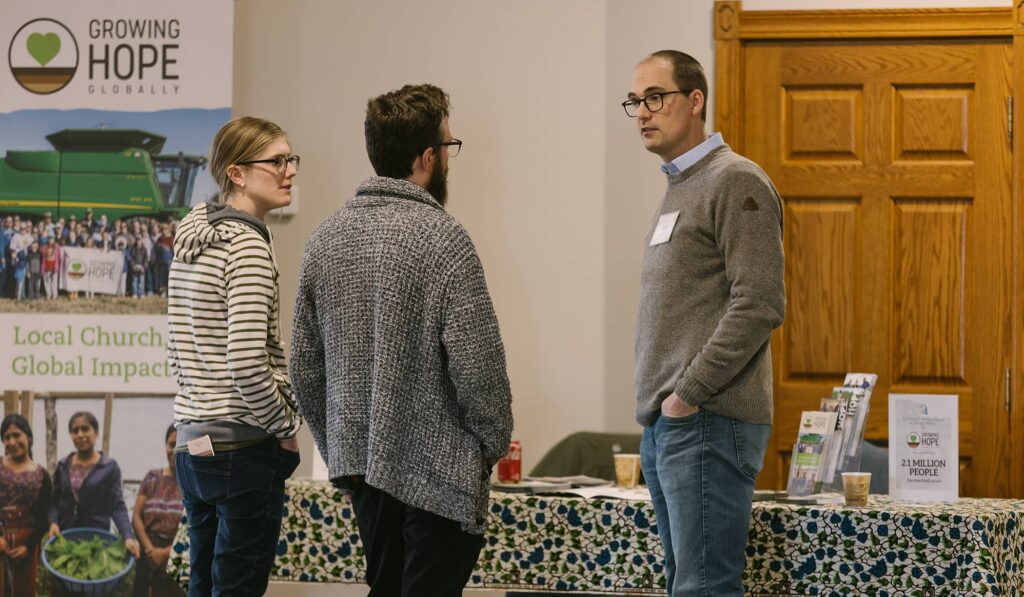
For those onsite, exhibitors offered an array of resources including: published materials on rural ministry; children, youth, and family ministry coaching, formation resources, and training opportunities; educational opportunities in the form of a “gap year’ discipleship program for students, along with a rural ministry certificate program; mental health supports and resources for local pastors and churches; and specialized ministries representing wilderness adventure experiences, global hunger partnerships, and pastoral transition services—all providing further ways to resource thriving churches.
“I appreciated the welcoming atmosphere.”
One other experience we must highlight is how on-site participants were recipients of the over-the-top hospitality ministry of our host church. This was stated best by one attender who said, “I was wowed by the dessert table at lunch today!”
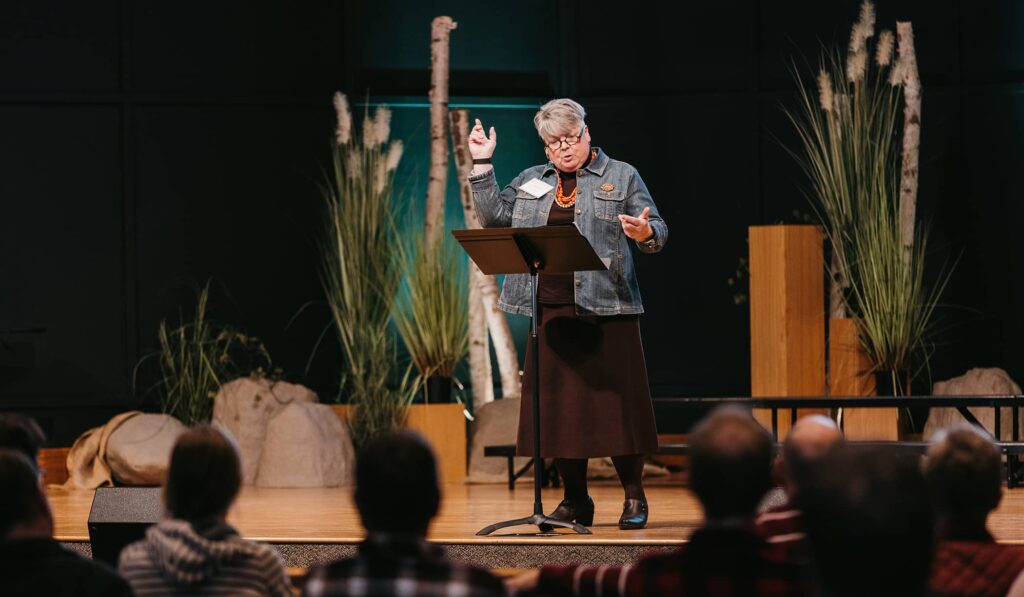
The closing address was delivered by the Rev. Heidi Wiebe, in which she reminded everyone of the importance for the Church to pursue mission clarity within each season of ministry. She highlighted this for several reasons.
First, mission—our sense of shared purpose—creates hope and reminds us that God designed us to live for something bigger than ourselves. Second, with mission clarity comes a greater motivation and focus on our Kingdom call and impact. Third, mission engagement or participation also produces joy for those involved. This in turn fosters hope, a renewed excitement and a deeper commitment. It is a deep, sustaining kind of joy that we find enduring through all seasons.
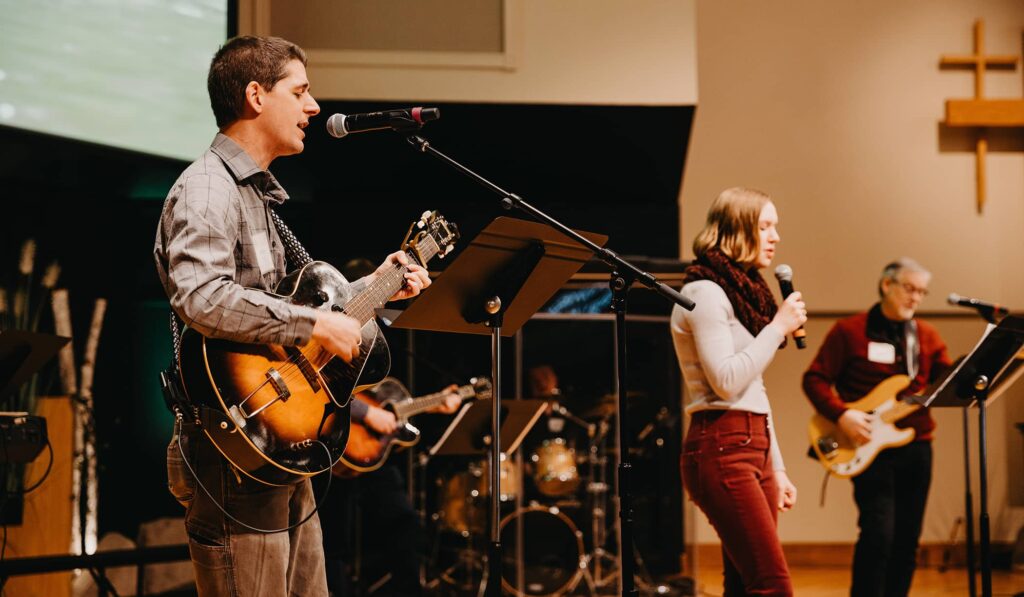
And it is this same joy, embedded in the day’s experiences as well as rooted in a shared faith, that framed our closing worship, as well. At its conclusion, this was captured well by one who said, “This was a ‘good’ day!”
Here’s what a few other participants shared about their experience:
- “I appreciated so much how applicable the content was to the rural context.”
- “This was my first time, I thought it was great!”
- “Today I learned about better ways to connect with my community.”
- “The topics addressed throughout the day were so relevant.”
- “I’m ready for more. How about two days?”
We praise God for how He blessed and used this day in the nurture of thriving rural churches. We look forward to the continued effect of the Rural Impact Leadership Conference even as we anticipate RILC 2024 on March 16!
The plenary sessions and workshops were recorded and are available for purchase here.
Note: all registered attenders will be given access to the recordings.
The clarion call of the Great Commission is simple: make disciples in Jesus’ name. Implementing a discipleship strategy, however, is mainly dependent on context.
I recently moved to a small town as a pastor whose vocation is discipleship. With me came my big-city discipleship experience and mindset. Discipleship and God’s call were no less urgent in my new, smaller community. Yet I was humbled rather quickly when I realized that what worked in one place did not have the same result in another.
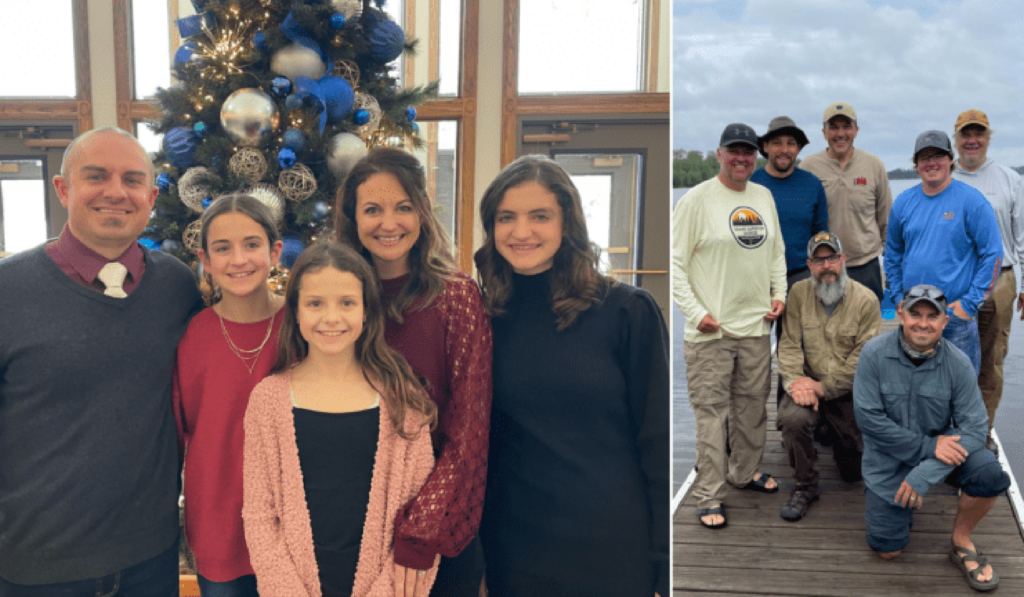
I’m convinced that the discipleship principles that apply in any setting include biblically-grounded instruction and regular shared experiences of vulnerability together. Teaching people God’s Word and sharing life as God’s people are the key ingredients to obeying the Great Commission—no matter where ministry happens. As such, the Church and Bible-loving leadership are indispensable. So, shouldn’t they translate seamlessly from a suburban to a rural context?
In a suburban setting, getting people to “do life” together was more complex, but vulnerable sharing came readily. There are more people with less association in more significant population densities. Because they likely didn’t work and live in the same circles, the risk was lower to being vulnerable, while the challenge of the gathering was higher.
The reverse is true in rural settings. If you’ve lived in one, you know. Life together is everywhere because you know half the grocery store when you walk in. That means vulnerability comes with a greater risk because people work, play and live in your circle. Discipleship thrives at the crossroads of God’s Word and vulnerable communities.
Both suburban and rural settings are fertile ground for Great Commission work. To the suburban discipler, put effort into the gathering. Getting people together for discipleship will be your context’s most significant challenge. To the rural discipler, foster vulnerability by building trust. People are already gathering, so your challenge will be to encourage deep dialogue. God’s Word and our tenacity to keep it front and center must remain committed for both.
Dave Mergens is the Pastor of Adult Formation at Alexandria Covenant Church, host of the 2023 Rural Impact Leadership Conference. Dave’s passion for discipleship has been a mainstay value in his 20 years of vocational ministry. He’s an avid outdoorsman who enjoys quality time with his family and friends doing life in adventure settings.
This article was originally published by Transform Minnesota and is reused by permission.
As a farmer, Peter Haugen from Dawson Covenant Church in Dawson, MN, knows farming and faith go hand in hand.
He shared, “It has always been really humbling to have so many stories in the Bible linked to farming.” It’s the connection that has led him and others to support farmers in the developing world through Growing Hope Globally.
The Northwest Conference has had a long relationship with Growing Hope Globally (formerly Foods Resource Bank), as a missional way to engage in supporting the work of Covenant World Relief and Development (CWRD) and other organizations that are responding to hunger through agricultural development. This happens through Growing Projects, which are local community-based projects that work with farmers, churches and others in the community to raise financial resources, by leveraging a portion of a harvest or some other commodity. The financial resources then go to help farmers in the developing world grow their own food.
Duane and Peter Haugen started the Prairie Water Growing Project in 2014. Duane was a part of another Growing Project, but when Peter started farming with his dad, they wanted to do something more locally.
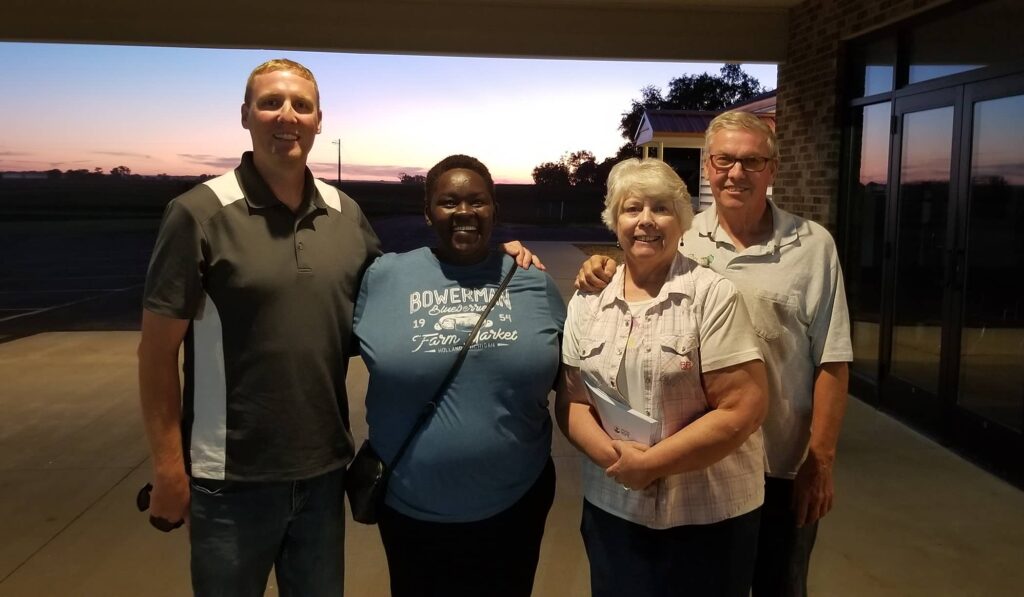
“Our Growing Project has changed and evolved greatly over the years,” Peter said, “It started with businesses contributing some money or resources to help cover costs on the acres that were being donated. Today, it is composed of individuals from the church and community that donate a portion of their proceeds to send overseas. It has ranged from a pastor raising goats, a church member with hives of honey bees, a young boy selling eggs, to farmers selling a few acres of crops from a field.”
They also find ways as a congregation to celebrate the work they do together.
“We gather each fall at the end of September to join in a meal at the church and have an update from the Overseas Projects we support,” Peter said. “This day also includes activities at a farm, like apple squeezing, a corn pit, a bale maze, and if it is possible, harvesting of some crops.”
Over the years their Growing Project has developed relationships with the programs they support. Covenant missionary Roy Danforth visited them and Dawson Covenant Church to share about the research and training farm in the Central African Republic that the Prairie Water Growing Project was supporting at the time. Peter was also able to visit the farm and see the work they were doing to equip people to grow nutritious food for themselves.
This last fall Philipine (Pini) Kidulah from West Pokot, Kenya, was able to visit his farm along with sharing her story with the congregation. Pini leads Jitokeze Wamama Wafrika, an organization that empowers women in agriculture and community development, which is supported by CWRD and Growing Hope Globally.
Growing Hope Globally is a Christian response to hunger that helps farmers in the United States support farmers in the developing world through agricultural development. Since it’s inception it has helped more than 2.1 million people move towards food security. CWRD is one of Growing Hope Globally’s several denominational partners that work together through a shared commitment of growing lasting solutions to hunger.
Peter says, “We like working with Growing Hope Globally because they do their homework on Overseas Programs tofund, and they do such a good job with updates and making connections. We aren’t just writing a check and wondering if the money is helping, we are investing resources and getting regular updates from the dividends of ourinvestment.”
When it comes to the idea of starting a Growing Project, Peter says, “Go for it! It doesn’t have to be this grand, showy thing. … Growing Hope Globally has a great support staff with resources to help share the story of what is being accomplished.”
If you would like to learn more about Growing Hope Globally and what it means to start a Growing Project visit www.GrowingHopeGlobally.org or contact their Regional Director Mark Swanson, who is also a Covenant Pastor, at mark@growinghopeglobally.org or (509) 494-9850.
In this Part 1 webinar we begin to look at some key rural contextual dynamics and related leadership principles for leading the rural church well. Because of a high relational value within smaller communities we explore the importance of trust, collaboration, facilitation, tenure, influencers, time, learning, etc. in establishing healthy leadership posture and effectiveness. In addition, we touched some on matters of decision making, social exposure and relational risks around conflict situations, conflict avoidance, closed systems and change.
This webinar gives recognition to the fact that for rural congregations to thrive, the congregation—in partnership with lay leadership and the pastor—must share the work of the ministry. Therefore, churches need to develop effective ways to equip their people for doing the ministry.
This webinar highlights the importance of current leadership modeling a learning posture, insights on the mobilizing, training, and empowering of laity for ministry, along with generational considerations for effective leadership development.
“Now these are the gifts Christ gave to the church: the apostles, the prophets, the evangelists, and the pastors and teachers. Their responsibility is to equip God’s people to do his work and build up the church, the body of Christ.” – Ephesians 4:11-12
A few Resources for Life-Long Learning by Pastors
Thoughts on the recruitment, training and deployment of lay leaders in ministry- Giese
Based on the experiences of the past several years, this webinar recognizes the need for discerning a “new normal” as “mission critical” for pastors/leaders and for congregations as a whole. So, in this webinar we look specifically at intentionally calibrating the real tensions of Being vs. Doing and of Competing Expectations—both personally and congregationally—as vital to the establishment of sustainable rhythms, ministry expectations and plans that foster greater missional health and momentum for the church.
Book references related to the Being vs Doing
Rural Webinar Notes- Sep 22- Dr. Weinert
Rural Webinar- Sep 22- summary reflections on expectations- Dr. Giese
The prolonged nature of the COVID-19 pandemic and the related social/cultural forces that emerged from it have been identified by many as “the Great Disruption.” Within this disruptive season came experiences of isolation, loss, dislocation, conflict, grief, change, disorientation and new opportunities to name a few.
In this webinar, we held open conversation on the direct impact all this has had on the composition and body life of the local church pre-COVID to now, along with discussion of key factors related to the renewing of our fellowships for increased missional impact.
Koinonia (Fellowship) as Framed in Scripture – Dr. Rick Weinert
We praise God for his grace and blessing upon our inaugural Rural Impact Leadership Conference (RILC) on March 19.
Beginning with the warm and generous hospitality provided by Alexandria Covenant Church, around 90 rural pastors and lay leaders experienced a full day centered on nurturing thriving rural churches. In addition, another 20 or so participants joined in online.
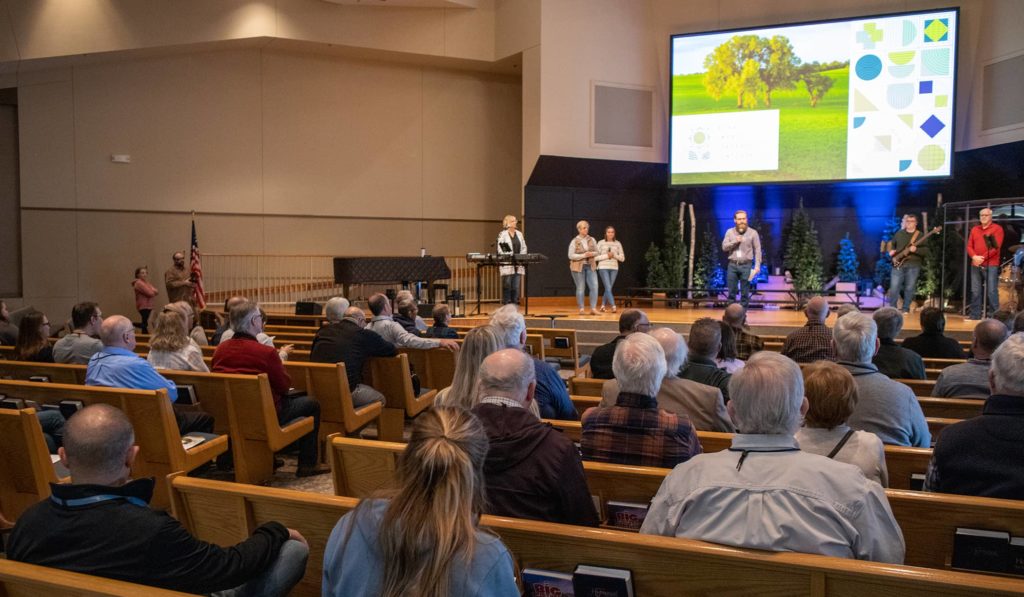
The day included times of worship, plenary presentations, workshops on targeted areas of ministry, fellowship and learning with others from similar contexts, exhibitor resources and surprise giveaways.
Here is just a snapshot of what we heard from participants:
“This conference was for us, the rural church! It was not only honoring and life-giving, but also insightful and full of practical ideas.”
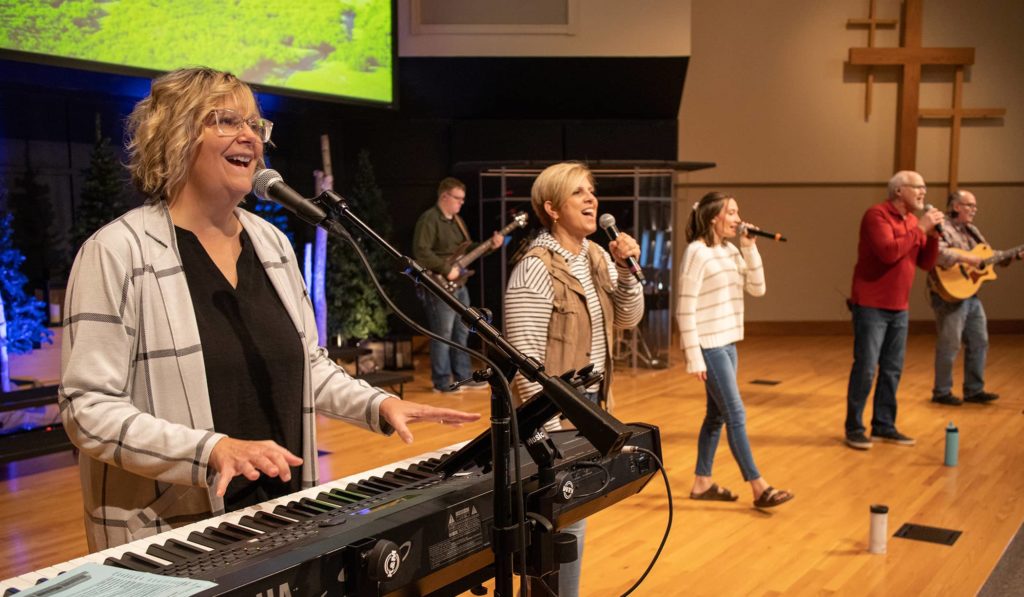
“The worship was truly driven by the Holy Spirit. I felt like I was present in the worship—it really touched me sitting at the computer. Well done! I plan on next year to attend in some way. Thanks for putting this event together. There are things I can use from the whole day. I will need to listen again, which is great feature.”
“Great day to help refill our tanks.”
“Logistics went well. Love the conference. Speakers were very good, with helpful insights. Keep these resources for small and rural churches coming.”
“Good connections, good workshops, good worship, good food, good prizes and great pointing to God through it all!”
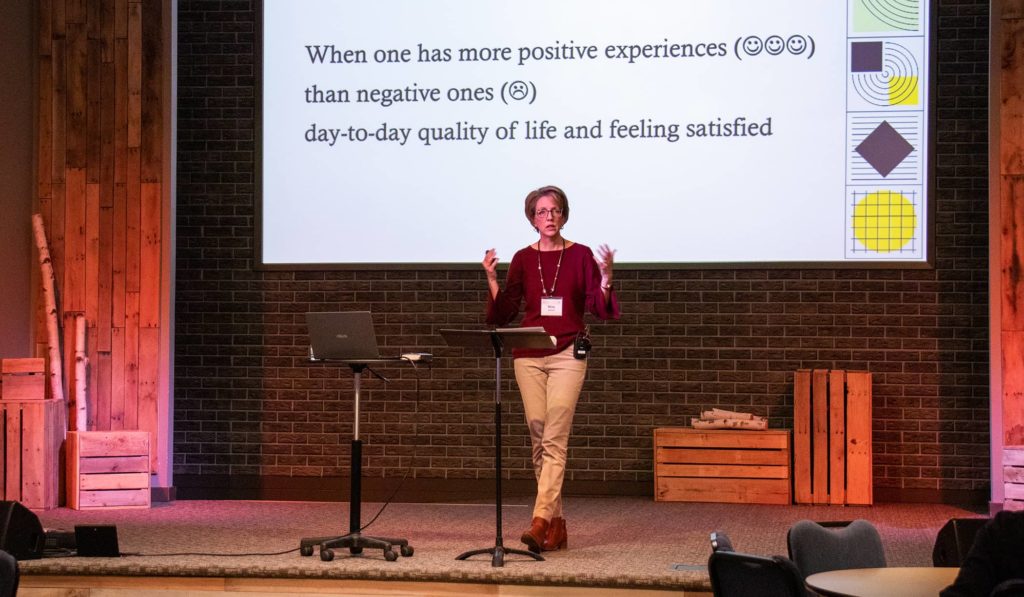
We want to say thank you to all of those who contributed to the success of this day—speakers, worship and workshop leaders, hospitality team, exhibitors, Alexandria Covenant staff, partners and the RILC steering team!
We look forward to gathering again next year for RILC on March 18, 2023, in Alexandria, MN.
Photo Gallery
As we have stepped into a new year, we remain mindful of how the residual effects of this past year continue to impact our daily experiences. These challenges are real. Yet even in times of great challenge, God desires for each of us to flourish within our calls for Kingdom impact.
This webinar explores three key areas to foster greater resilience and renewed motivation for ministry. The three areas covered are boundaries, support systems and fresh vision. A narrative that helps to frame this conversation is that of Elijah. In addition, the 3 Pillars of Missional Ministry construct was introduced along with several books. Those are offered below for your reference and continued learning:
Foundation for Missional Living (PPT)
Margin: Restoring Emotional, Physical, Financial, and Time Reserves to Overloaded Lives by Richard Swenson
Sacred Rhythms: Arranging Our Lives for Spiritual Transformation by Ruth Haley Barton
Soul Feast: An Invitation to the Christian Spiritual Life by Marjorie J. Thompson
Thinking, Fast and Slow by David Kahneman
This webinar is built on the foundation established in “Let’s Talk About the Elephants in the Room, Part 1.”
Part 2 explored further how our own personal self-awareness contributes to our ability to bring a non-anxious presence into our interactions with others. Navigating interpersonal dynamics amidst contextual and cultural realities with others especially in times of conflict and challenge stretches the best of us.
This webinar provided practical insights for rural ministry leaders who desire to lead well within these times and circumstances.
We recognize that we are living in highly charged and complex times that have contained cycles of dislocation, division, disorientation and loss. As pastors and leaders it is of utmost importance that we frame our challenges biblically, along with practicing self-control over our own emotional responses in situations where anxiety is high.
This webinar presents different constructs to consider as ways to better frame these challenges, and better navigate relationships impacted by them. Relational wisdom practices, the Approaching Differences Framework, and Choice Map were all offered as resources to help frame the discussion. These resources, with accompanying notes, are offered below for your continued education.
Approaching Differences diagram- IV
Approaching Differences Framework- insights
Choice Map- Adams
Relational Wisdom- Relational Wisdom 360
On a June evening in 2020, I received a phone call asking for help. Phone calls asking for assistance are nothing new in ministry. In the midst of a pandemic where we were still getting our bearings around in-person services with masks and social distancing, asking our rural church if we could help someone develop their ministry seemed—on the surface—daunting.
We were still wondering if we would be able to do any fall ministry with the restrictions we were navigating. Nevertheless, my initial conversation with Paul Menne resulted in a one-on-one meeting to see if we could help in his journey.
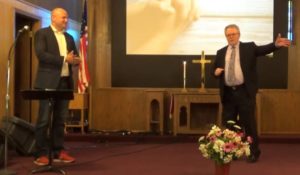 In Paul’s words: “I felt a calling toward Army Chaplaincy and worked toward that calling for the past five years by going to Bethel Seminary, serving as a Chaplain Candidate in the Minnesota Army National Guard, and going through the Covenant Orientation program. While finishing all these tasks and looking forward to the next chapter of life, I knew that I wanted to be better equipped for what was ahead. I also had a mentor suggest I look for opportunities to serve as I applied for Army Chaplaincy. I reached out to the Northwest Conference and let them know my situation and what I was looking to do. They connected me with Pastor Gary and Winthrop Evangelical Covenant Church.”
In Paul’s words: “I felt a calling toward Army Chaplaincy and worked toward that calling for the past five years by going to Bethel Seminary, serving as a Chaplain Candidate in the Minnesota Army National Guard, and going through the Covenant Orientation program. While finishing all these tasks and looking forward to the next chapter of life, I knew that I wanted to be better equipped for what was ahead. I also had a mentor suggest I look for opportunities to serve as I applied for Army Chaplaincy. I reached out to the Northwest Conference and let them know my situation and what I was looking to do. They connected me with Pastor Gary and Winthrop Evangelical Covenant Church.”
Our initial discussion provided clarity in what Paul needed to help him move forward in his journey. Additional experience in preaching and teaching, along with a working familiarity in pastoral ministry responsibilities would provide Paul with the experience and tools necessary to minister as an Army Chaplain.
New pastoral internship
My experience as Academic Dean in a Canadian Bible College included designing pastoral internships for our students so, along with our Leadership Team, we designed a six-month pastoral internship. Paul and I would meet weekly where we would discuss ministry issues, expectations and topics relevant to pastoral ministry and how that would dovetail into his chaplaincy.
We started small by having Paul lead in certain aspects of morning worship, and we built up his involvement in the services to the point where he would lead the service and give the morning message. Paul preached four times in conjunction with the current sermon series. Involvement in weddings and funerals, along with Leadership Team meetings, also helped in Paul’s development.
The pace and program that was developed helped to build Paul’s confidence and comfort within the community of Winthrop Covenant.
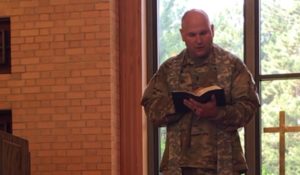 The outcomes of this internship became evident for both the church and for Paul. As far as Winthrop Covenant is concerned, what this internship did for the church was remind them that when we remain available to God for opportunities to minister, He will provide those opportunities. Internships, equipping the saints, preparing people in their call to ministry is not something reserved for the urban church. The rural church can be just as effective when open to the Spirit’s leading.
The outcomes of this internship became evident for both the church and for Paul. As far as Winthrop Covenant is concerned, what this internship did for the church was remind them that when we remain available to God for opportunities to minister, He will provide those opportunities. Internships, equipping the saints, preparing people in their call to ministry is not something reserved for the urban church. The rural church can be just as effective when open to the Spirit’s leading.
From Paul’s perspective, “They [Winthrop Covenant] opened their hearts and doors for me to be a pastoral intern with them. All despite not knowing me and this being in the middle of the COVID pandemic. When other churches had shut their doors, gone virtual and were no longer offering up internships, they went the other direction. They ran into the fire with me and for me.”
Winthrop Covenant contributed to Paul’s commission to the United States Army and he, along with his wife, Mary, and their nine children, are stationed at Fort Jackson in South Carolina. Paul is the Chaplain to the recruits as they arrive for boot camp.
For the benefit of the Kingdom
As Paul reflected on his experience with Winthrop Covenant, he shared: “Winthrop was able to not only develop this program to meet my needs, but also to meet the needs of the church community. The ability to balance and reconcile the needs of what was seemingly different things led to a connection of love between myself and Winthrop ECC. Even after I completed my internship, I returned to preach and lead once more before moving to South Carolina to assume my new position as an Army Chaplain.”
“The love Winthrop ECC had for me, and my family was and is something truly special that I did not expect, nor think would be available to me. But it was, and they showed me what kinds of ministry a small rural church can do,” he continued. “There is a whole untapped resource out there within the ECC body that I hope other churches can experience. I am grateful for Winthrop Covenant and for Pastor Gary for being exactly what I needed, exactly when I needed it, for the benefit of the Kingdom as I continue on my journey.”
We praise God for His work in our lives and continue to search for other opportunities as He gives them.
By the Rev. Gary Gilkinson, Lead Pastor of Winthrop Evangelical Covenant Church
While the Northwest Conference is home to approximately 140 churches, about half of them are outside of metro areas. Whether in a town of 10,000, or 100, or located in the country, these churches have a great mission field.
The majority of people in rural communities do not attend church. This positions rural churches with the opportunity to come into people’s lives and introduce them to Jesus. One of the ways churches do this is by coming alongside each other—collaborating and serving their communities together. It’s a beautiful representation of spurring one another on toward love and good deeds as admonished in Hebrews 10:24-25.
Community Covenant Church is located in Huntley, MN. Population 154. The church was established in 1986 and drew members from many surrounding communities over the next 30 years, according to the church’s chairwoman Kay Sauck.
“While the membership numbers have always been very good for a church located in a small community, our numbers started dropping over the past four or five years,” Sauck said.
As of 2019, the church was without a pastor, and by 2021 it was home to a core group of about 15 people. Sauck contacted the Northwest Conference while the church was in a climate of change and again when they were wanting to move forward.
“Kara Stromberg (NWC Associate Superintendent) was available to take my call, and I am forever grateful. She listened as I shared what we had been through and that we needed to move forward. Before the call ended Kara assured me she would be working on our behalf,” Sauck said.
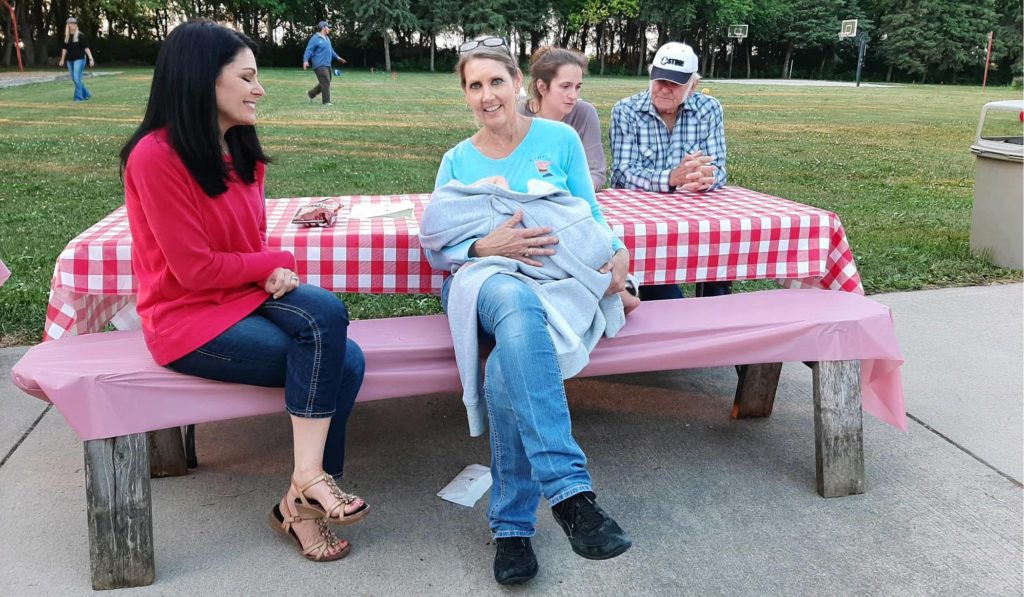
Waiting and praying
Those at Community Covenant waited and prayed.
Sixty miles northeast of Huntley, Michael Behm is the pastor of Real Life Church in Waseca, MN. Although he grew up in the suburbs, during seminary Behm felt God’s call to give his best to rural areas and small towns. Stromberg reached out to Behm about potentially providing sermons for Community Covenant. The leadership at Real Life connected with the remaining members in Huntley, and a collaboration began.
At first, Community Covenant watched Behm’s services online, along with pre-recorded messages specifically directed toward its congregation on special occasions. But God had more in store for the two churches.
“I thought, ‘What if we could establish a relationship and have something more ongoing?’” Behm explained.
Without hesitation
Enter John and Deb Westphal. The Westphals have been active members of Real Life since the very first service of the NWC church plant on their screened-in porch. God had been moving in their marriage, laying a desire on both of their hearts to pursue rural ministry together. When Behm asked the couple if they’d like to join him in meeting with Community Covenant, they agreed without hesitation.
“The core group who are left in Huntley are great people, they have a real heart for serving others. When I recognized that about them, I said, ‘I’m all in,’” John Westphal said.
From that point forward, the Westphals committed to coming alongside the people in Huntley—with John providing two messages each month in person and Deb taking on the role of shepherding. They also, along with their two children, enjoy taking part in ministry opportunities in Huntley including the monthly dinner the church provides for its community.
Deb will be going back to school for a rural leadership and ministry program at Oak Hills Christian College in the fall. She is excited to see how God will use this program to further what she and John are doing at Community Covenant. Deb also hopes to be an encouragement to the congregation.
“I want to be that person to talk to if someone is going through a difficult time or needs prayer. The people here give so much of themselves to the church and to others, and I want to make sure they are being fed as well,” Deb Westphal said. “So, I will be starting a Bible study in the fall with the goal of feeding God’s servants through His word.”
“I have been reminded that all churches go through changes, and for those of us still at Community Covenant Church, it feels as if we are starting new,” Sauck said. “We not only feel unified, but it feels like family, and we pray that God’s will continues to be done here.”
God is present and at work
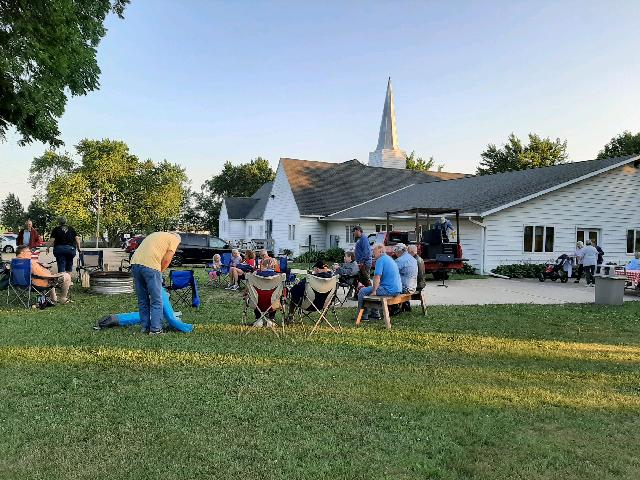 Although the changes have not been easy, the congregation is thankful for the help they’ve received and hopeful for what God has planned for the future.
Although the changes have not been easy, the congregation is thankful for the help they’ve received and hopeful for what God has planned for the future.
When the Westphals walk through the doors of Community Covenant, they sense God’s presence.
“What I see in them now is a sense of happiness and joy—they are reinvigorated,” John Westphal said. “Deb nor I take credit for it. God is present and at work. A sense of togetherness has really taken hold there.”
While the collaboration between Real Life and Community Covenant is still in its infancy, the overall goal is to come alongside one another long-term.
“It turned into something even more than I imagined. We want to see Community Covenant grow in number and bring more people on board, so they’ll be able to afford to hire a pastor. It could be John and Deb, or it might not be. We’re leaving it open,” Behm said.
Behm’s passion for rural churches has been a blessing to the congregation of Community Covenant.
“That’s really my heart—specifically small-town churches, but any church that wants to connect Jesus with their community. I’m all about it. Let’s connect and see how we can help one another,” Behm said. “There are incredible people, some great leadership and a lot of talent in these small towns—and they’re consistent, which is huge.”
Behm encourages others to not overlook the rural church. Regardless of location, there are countless people still needing the hope of Jesus.
Story By Katie Honnette, freelance writer and member of Trimont Covenant Church.
“Just come up here for a visit,” said Roger as my wife Liz and I were searching for God’s placement for us in ministry. “Up in the frozen north? Cook, MN? Not a chance,” I said under my breath.
I experienced great fellowship over the phone with Roger, a member of the pastoral search team at Cook Covenant Church, but I gave the obligatory answer, “We’ll pray about it.” Meaning, “Not very much.”
Months before the call, Liz and I had prayed, “Lord, we will go where you want us.”
Some churches said no to us, and we said no to some churches. Months went by since the call with Roger and suddenly God hit me with a 2×4: “How can you say you will go anywhere I send you without even checking out the church in Cook?”
The church was not what I had in mind. And besides, Liz gets cold easily and her mother lived close to us. I called the search team and arranged for a quick visit thinking I would just satisfy God and move on.
To our amazement, we loved our visit and fell in love with the people! On the way back, Liz and I looked at each other and said, “This is God’s call.”
This was the first of many “God sightings” involving Cook Covenant Church. Liz’ mom responded saying that she would not even visit us up there. Soon, however, she would be living with us in Cook and finding her own place on the lake in Duluth, MN.
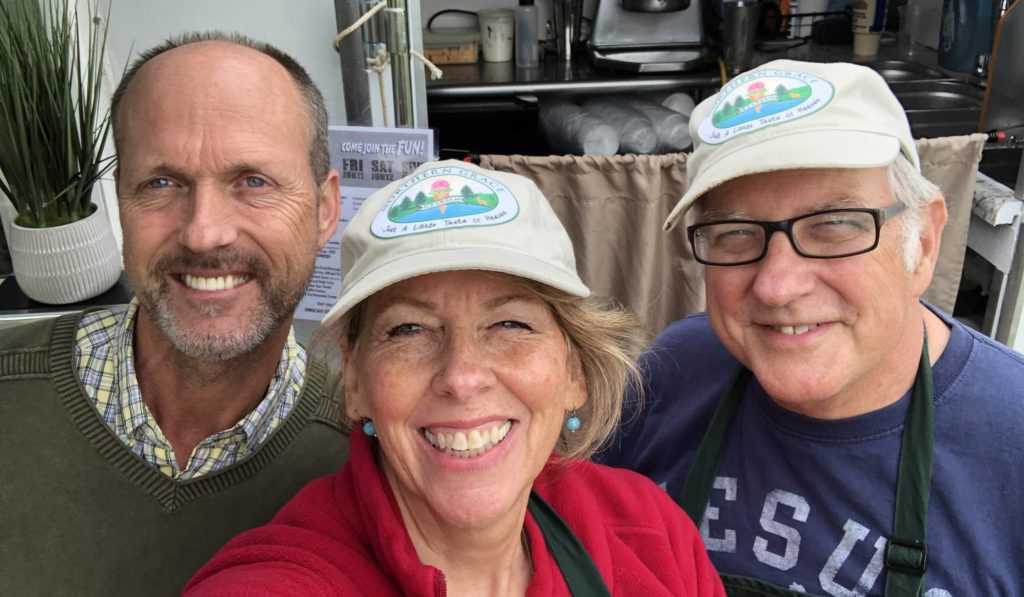
‘Little’ victories
Since coming here to Cook, we have learned to count “little” victories. For example, I counselled and married a couple just before the pandemic with the husband coming to trust in Jesus as his Savior.
Then the pandemic hit—and we were dragged, kicking and screaming, into the 21st century regarding technology. Attendance was very low, but sometimes up to 400 people tuned in on facebook.
And that couple? They came back to our church and are now running our technology ministry.
Deaf ministry
Even further north, there is an off-grid cabin we considered buying as a getaway spot since the next-door neighbors came to our church. Since it was quite far, and I didn’t like the idea of having to make our own electricity, we passed.
A deaf woman named Alisha bought the place, and her neighbors brought her to church. Alisha is a vibrant Christian and ministers encouragement very naturally. But communication was a problem. She had a writing tablet, and we downloaded an app called “Live Transcribe” so she could participate in worship.
In addition, we had close to 20 people sign up for Zoom training in American Sign Language (ASL) from the American Association for the Deaf. When Alisha told us she was bringing a friend on a recent Sunday, we assumed that friend would also be deaf. But instead, Anne is hearing and very fluent in ASL. She said she would like to come every other weekend—clear from Wisconsin—to worship with us.
Our people responded with even greater desire to learn ASL. Alisha is now teaching us conversational ASL every Tuesday and letting Jesus shine. I recall that I took a sign language class as an elective in college. Over the years I wondered about possibilities for deaf ministry. I don’t know what God will do, but He remembered those possibilities too.
We’ve been learning so much. Deaf people don’t consider themselves disabled, and we have changed our thinking too. God ministers not only to the deaf, but through the deaf, with “like precious faith.” Many deaf or hard of hearing people are overlooked in ministry. Our church sees a door opening.
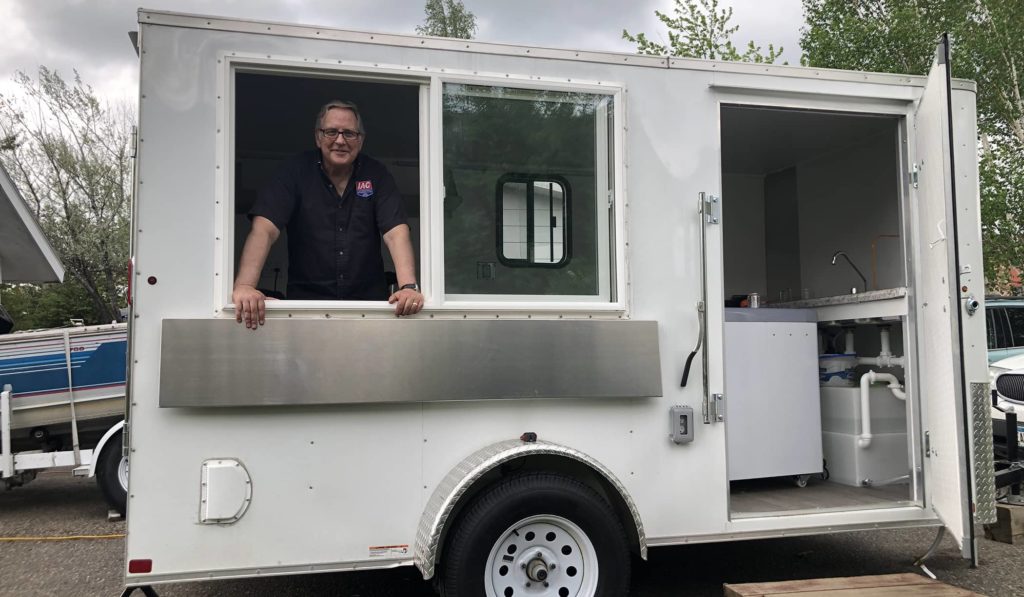
Northern Grace Ice Cream
Coincidentally, Alisha is now working for us. As a bi-vocational pastor, I was looking and praying for summer work. One day God simply said, “Ice Cream.”
Somehow I knew that God was meaning to make my summer gig an ice cream business. Liz and I wanted to make it an outreach and a ministry. That’s how Northern Grace Ice Cream was born.
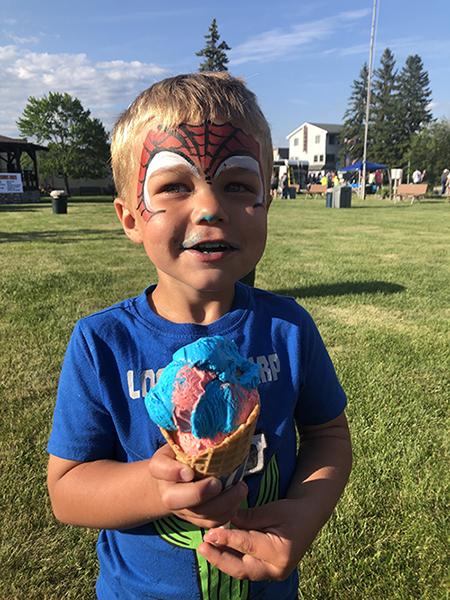 Our tag line is: “Just a little taste of Heaven.” Our mission statement is: “Serving up God’s grace one scoop at a time.”
Our tag line is: “Just a little taste of Heaven.” Our mission statement is: “Serving up God’s grace one scoop at a time.”
Alisha is very outgoing and wants to meet people, and we do too—witnessing to the grace of God as much as we can. It’s been a lot of work, but we were finally able to open a few weeks ago. In addition to our own livelihood and support to our church, we are contributing to the local food bank, a food and ministry program for a Maasai village in Kenya, and the Billy Graham Evangelistic Association.
God is at work in the “frozen north,” and we are thrilled to be a part of what He is doing.
Follow Northern Grace Ice Cream on Facebook
Read more about the formation of Northern Grace Ice Cream in the local paper
By Brian Burton, Pastor of Cook Covenant Church
Several weeks ago, I had the privilege of participating in a year-long celebration at Salem Covenant Church in Pennock, MN. Believe it or not, this church is 150 years old! This makes it the oldest church in the Northwest Conference as it predates the formation of the Covenant denomination by almost 15 years.
Lest we stereotype either historic or town & country congregations, Salem is a vibrant and thriving church. It has a wonderful facility with a gymnasium, even as it is situated amidst farm fields. It is pastored by the Rev. Jonathan Wilson, a gifted, brilliant and godly pastor. FYI … Pastor Wilson will be the Moderator at the Covenant Annual Meeting in just a few weeks. This gives you an idea of how highly respected he is in the broader ECC.
Following the morning service and a wonderful meal shared with the Wilsons, I was intending to head home immediately, but found myself wandering through the church cemetery instead. It sits just beyond the church building, something that is quite common in rural settings.
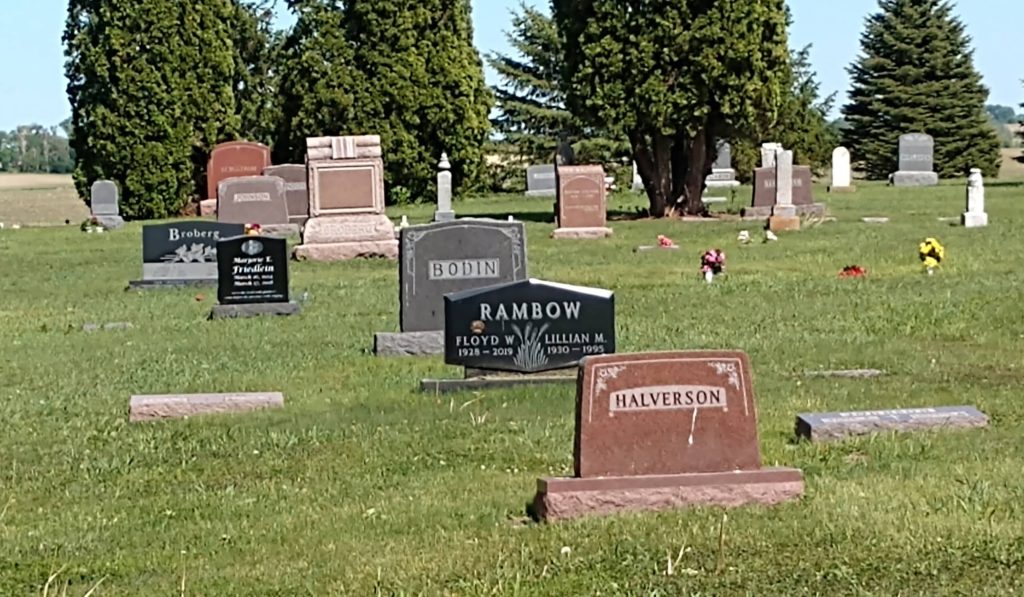
Suffice it to say that it was a moving experience for me. As I meandered up and down the rows, I recognized so many of the surnames of those buried there—names that have been influential in the formation and development of the broader Evangelical Covenant Church. In fact, several of the families buried in this holy place continue to provide pastors within our own Conference and the broader ECC. The earlier faithfulness of these departed saints continues to bear fruit in our midst even to this day.
It makes me wonder, will the lives we are living now produce the same in the future?
As Superintendent, I have had the privilege of connecting with a broad spectrum of churches. And even while so much of the emphasis within the broader Church appears to focus on metropolitan contexts, I am very aware that much of our strength is from elsewhere. As such, it is our desire to be more intentional in sharing some of the wonderful things that are taking place in churches throughout the NWC.
I thank God for churches, like Salem Covenant in Pennock, that continue to minister in powerful ways within their communities. I am grateful for the role these “unsung” churches and pastors play in our shared life.
By Mark R. Stromberg, Superintendent
Leading Kingdom Change in Uncertain Days is the second in a 2-part series on leading change in rural contexts. This webinar addresses spiritual and cultural factors that impact leading congregational change, including lingering effects of COVID-19, and technology, facility, and infrastructure considerations. Additionally, the webinar includes practical examples and rich discussion on best practices specific to discerning/leading change, congregational life, and community mission.
It has been said, “If you’ve seen one rural county, you’re seen one rural county.” The reality is rural communities are complex and varied. So, there is no one-size-fits-all approach for the church. We see rural congregations occupying the center of busy town squares to churches dotting the sides or unpopulated state roads. This presence is amidst what represents a changing, complex and culturally conflicted segment of America.
It is in these settings that factors of growth, decline and change present on-going challenges and opportunities for the Church and its mission. In this webinar, we unpack a biblical foundation for change, as well personal and practical implications for the leader.
We have observed how this past year both exposed and accelerated various issues/dynamics within rural/small town community life and congregational ministry. In light of our current landscape, we are pleased to partner with Oak Hills Christian College leaders to reflect on what we learned in 2020 that will inform our ministry in 2021.
Specifically, how do conflict and power inform leaders’ pastoral call and kingdom mission? How can pastors maintain a kingdom focus in divided times? What does self-care and resiliency look like in a season of crisis? This webinar is intended for rural leaders, but is also a helpful education piece for all ministry leaders who desire to understand how our kingdom mission plays out within our current climate and settings.
Rural ministry matters. With a significant number of NWC churches serving rural communities, we want to be intentional about resourcing and equipping all of our ministry leaders and churches. This webinar is the first in a regular series on rural ministry, and includes conversation on rural contextual distinctives, discipleship and isolation.
We are grateful to the Oak Hills Christian College team for their decades of ministry experience and expertise in this area. The next rural ministry webinar will be on Jan. 13, 2021. For more information on the Oak Hills Certificate Program in Rural Leadership and Ministry, download the flyer.
